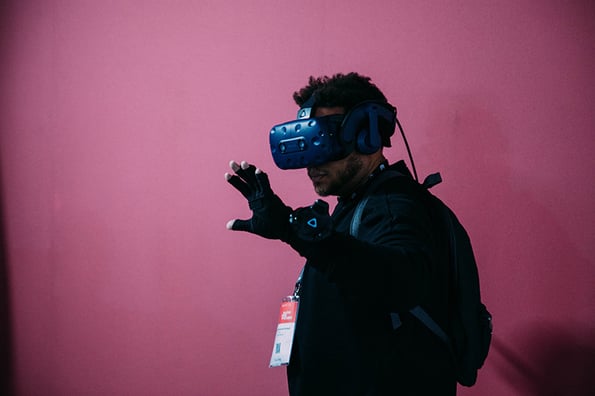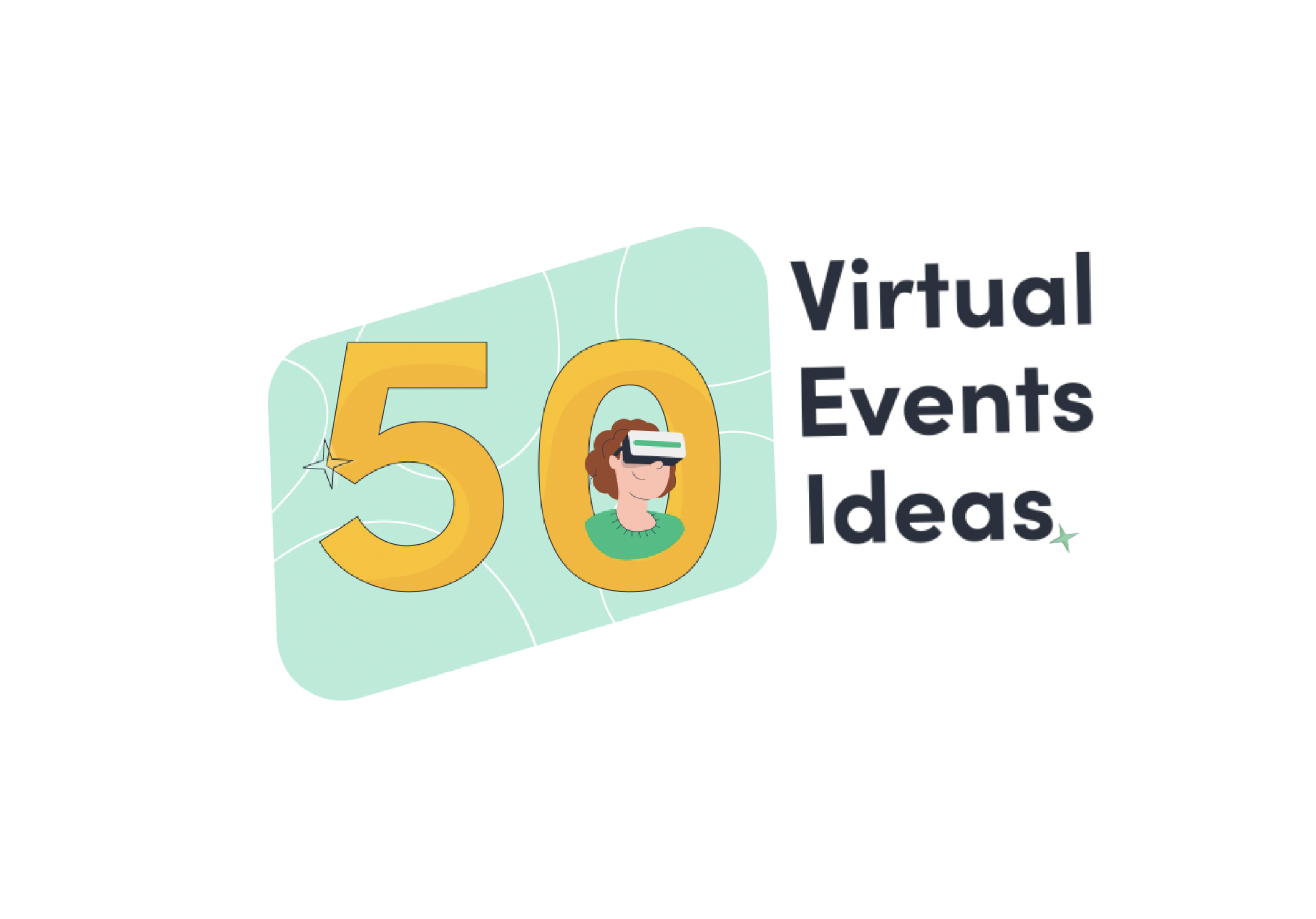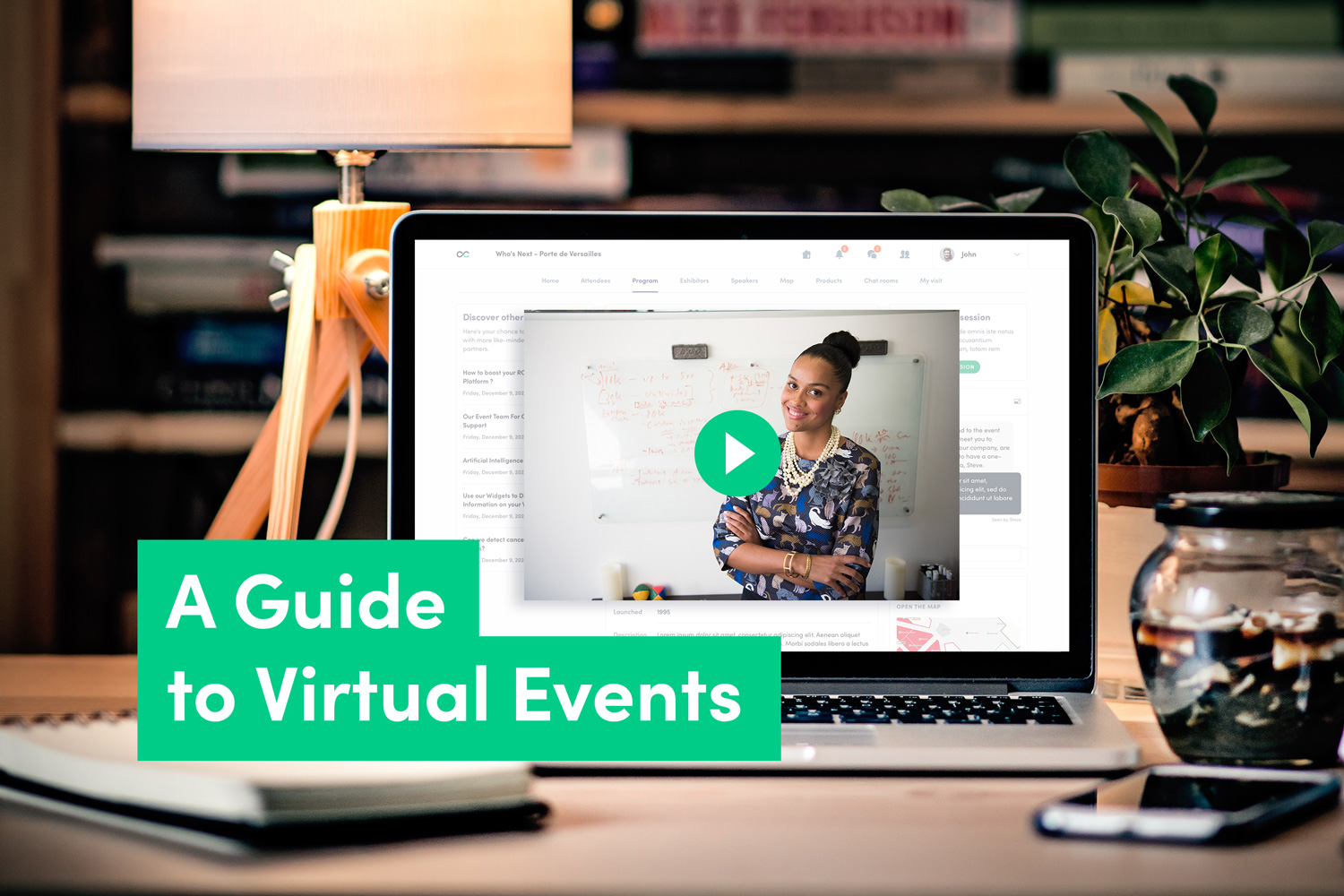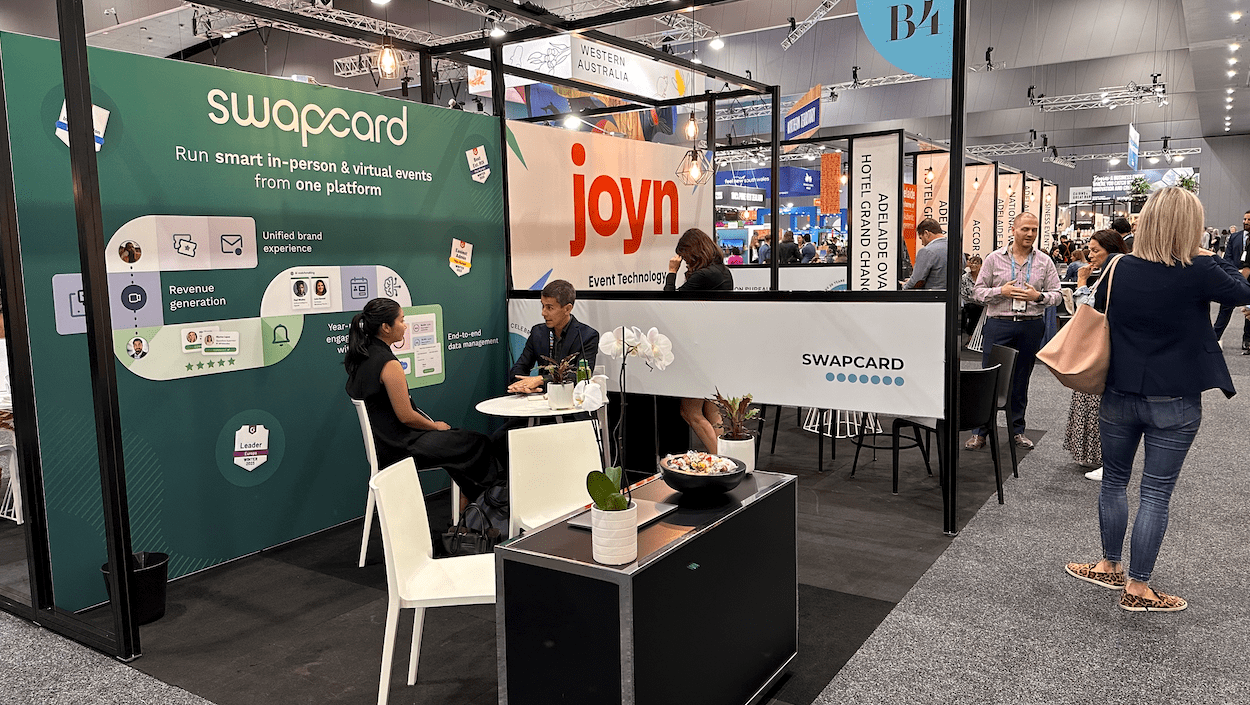So things are tough. The event industry is struggling to keep business afloat with the current COVID-19 travel restrictions, bans on group gathering and its consequential financial impacts. But things are looking up.
There are high quality, innovative technological solutions that can help events switch to virtual in this time of lockdown and social distancing, and even beyond! You can still provide value, keep an audience engaged, deliver expert knowledge and bring people together online. You just need the right tools.
But wait - what's the difference between virtual, physical and hybrid events?
When broken down into its purest form, an event is the gathering of people who have common interests - a practice as old as the human race. The need to be part of a community of like-minded people is a part of our DNA. Events have evolved over time and in modern days, there are many types of events in the industry.
Physical events, quite simply, are in-person events. There are people gathered in a venue and they meet face-to-face. Virtual events take place exclusively online and attendees join from wherever they are - home or the office. They don't travel to a physical location for the event, but rather attend by clicking a link, watching speakers present online and talking to other attendees via video calls or online messages.
A hybrid event is a mix of the two - a live event with virtual component.
The first question to ask yourself when considering an online approach is: can my type of event even go virtual?
Webinars & Virtual Series
Webinars are short for web-based seminars and usually occur in the form of a presentation, lecture, workshop. They can be once-off or part of a series and the goal generally revolves around teaching or educating the audience.
-
Why it works
The audience is usually muted as they listening to speaker, as in a class, and the floor will usually open for questions at some point. That means the speaker has free range to present in an engaging, interesting way and the audience's attention is free to be fixed on the content. The audience usually comes prepared to learn something, so they are likely to listen intently and take notes.
-
Must-haves for a successful webinar
The most important thing is an expert speaker who can delve into the detail of the chosen topic and keep the content captivating and easy-to-read. Colourful slides with less text than images, graphs or videos always help to maintain audience attention, as do audience response tools such as quizzes, Q&As and polls. It's also important to record each session and send a recap email after the webinar with the video, in case people want to rewatch the talk.
-
Challenges with webinars
In such a top-down structure, this type of event can leave the attendee feeling isolated as they don't always interact with other listeners. On top of that, the attendee list is not visible to the public and they are sometimes blocked from discussing the topic in real time.
Virtual conferences
A virtual conference is a 100% online event with speaker sessions, in the form of plenaries or breakouts, exhibitors and sponsors with an online space to display their products and services as well as networking opportunities for attendees.
-
Why it works
An online event means lower costs for planners: there is no venue, no catering, no rental insurance and less staff to pay. This cost effectiveness could potentially lead to lower stress levels in the event management. Planners are therefore relieved of some stress and can focus on engaging a broader audience. A virtual event can last longer than a physical one as people from different time zones connect at different moments of the day. 100% online events are also more eco-friendly, with smaller carbon footprint.

-
Must-haves for a successful virtual conference
Besides all the basics of a good physical event: quality content, engaging speakers, attractive presentations. But the important aspects to add are an all-in-one event platform that provides live streaming of sessions, integrated video calling, audience response tools during sessions - such as polls, surveys, Q&As and engagement opportunities with speakers - quality content and powerful networking tools and opportunities.
Virtual trade shows
While it might seem a difficult feat, trade shows can indeed be held virtually. A 100% online trade show is where all sales, lead generation and networking are done online through an event platform.
-
Why it works
With such a large percentage of the world's population using the internet and the growth of the online shopping industry, virtual trade shows are a logical step towards the future. Exhibitors have the opportunity to customize their booths, offer on-demand content, provide chat forums and perform online transactions from behind their computer screens. This means they save time and can talk to numerous potential leads at the same time, unlike at a physical event.
-
Must-haves for a successful virtual trade show
Potential buyers need to have clear, detailed information about products & services on the event platform. The platform also needs to allow buyers to save purchases in an online cart or a wishlist. Powerful chat & video call tools should be integrated into the platform to create an optimum networking experience and generate leads.
-
Challenges with virtual trade shows
People who are set in their old ways might not be open to buying things they've never seen in person or held in their hands. In the past, 3D platforms with digital booths have displayed low usage rates. So it's the event planner's job to harness the power of technology to render services and products as attractive as possible for potential buyers on their online event platform.
Hybrid events
A hybrid event is a mixture of online and onsite. There is a physical aspect of the event, where people attend in-person, and another group of attendees that stay home and connect virtually. The speaker sessions are then watched in person and through live streaming, and networking occurs both physically and digitally.
-
Why it works
Event planners can reach a larger, globally-connected audience spreading over different time zones and geographical regions. More people can potentially attend your event due to the reduced costs for attendees, as well as people who might be blocked from attending due to responsibilities at home or visa restrictions. A hybrid event also give attendees the opportunity to network with more people in a wider geographic range than they could at a 100% physical event and, as we know, networking is one of the principle objectives of many people who attend events. This type of valuable networking can occur in-person or online.
-
Must-haves for a successful hybrid event
For a successful hybrid event, a powerful event platform is invaluable. It must have integrated live or pre-recorded streaming tools for sessions and online and onsite networking opportunities, including video calls and calendar integrations with built-in notifications. Engagement tools for audience members are also recommended, such as polls, surveys, Q&As and other methods of interaction with speakers.

-
Challenges with hybrid events
One risk with a hybrid event is that people who would usually attend the event in-person might see virtual attendance as an easier option and join from home instead, lowering the attendance at the physical component of the event.
The future of the industry: The Hybrid Model
After COVID-19, there will be lasting changes in the events industry. After weeks of efficient remote work, companies will start to rethink the value and necessity of physical participation for certain sectors. Travel budgets will be cut as travel will come to be seen as expensive, time-consuming and exhausting, not to mention the negative effect of the CO2 emissions on the planet.
Reaching a wider, more globally connected audience is another positive point that will likely be of great value in the future. Planners will have access to more varied audiences and boast higher attendance rates by allowing certain people to attend virtually.
A hybrid model is a stronger, more sustainable business model as it's not limited by exhibition space and therefore has less fixed costs for event planners.
In the future, gathering a community will happen more often through virtual means, but it doesn't make the value of the connections any less important.
The Hybrid Experience
It's highly likely that national borders will remain closed or reinforced for the upcoming couple of months to flatten the curve and stop the spread of COVID-19. When borders open again, people won't be available to travel right away. There will be cuts to companies' travel budgets, visa issues and financial difficulties as industries suffer and employees lose their jobs. There is likely to be a drop in physical attendance for events for the next few years.
So the event industry has to embrace change and trust technological solutions to ensure they don't lose that part of their audience. Make room for those who can't travel, to attend online. Event planners should be aspiring to a new, hybrid business model. The following aspects are what make a valuable, immersive and meaningful hybrid experience for attendees:
-
Knowledge Access
One way to ensure hybrid events reach a wider audience is to offer varying levels of tickets with different prices and different access. For example, tickets for virtual attendees could allow access to specific sessions of your virtual conference, without access to the networking part of the event. Physical attendees could have access to all networking tools and live streaming of the content, plus interactive features during sessions, such as Q&As with speakers.
Another way to optimize hybrid events is to ensure the right tools. The online audience deserves an engaging, valuable event, just like their physically present counterparts. An event platform that has both a web app and a mobile app that can integrate with registration software is ideal. Swapcard is an event app that not only offers an intuitive web app and syncing with registration providers, but also matchmaking powered by artificial intelligence and a host of virtual tools.
An up-to-date, integrated program is available in Swapcard's web or mobile app and attendees will receive notifications to remind them when sessions start. They'll also receive AI-powered suggestions of the most interesting and relevant sessions to attend, based on their profiles and interests. Virtual attendees can live stream sessions directly within the app and both people on site and online audience members can engage with speakers and with each other during sessions with Swapcard's integrated audience response tools, including polls, Q&As and live discussions.
-
Networking
Attendees can schedule meetings with people who are physically present or with virtual attendees and their in-app agendas are automatically updated. A video calling tool is integrated into the meeting so people can meet "face to face", even when they're not in the same room. We at Swapcard know the value of in-person meetings and we want to recreate the meaningful bonds people create with our technological expertise. Push notifications will remind attendees of their scheduled meetings a few minutes before the start.
Based on users' profiles, interests and actions on the platform, Swapcard's AI-powered matchmaking feature suggests the most relevant people to meet with. AI analyzes users' data and actions within the app to collect people, sessino and products they are most likely to be interested in. These suggestions save users time because searching for business contacts can be exhausting. With AI, they'll pop right up in their app!
-
Sponsorship
Swapcard's virtual features allow exhibitors to gain business leads and take something valuable away from an event, even if they have a digital booth. With the exhibitors' maketplace and live demos in the platform, attendees present and virtual alike can connect with exhibitors and forge meaningful business connections.
We at Swapcard like to think of event planners as community builders. They bring people together, whether physically or virtually, to forge bonds and create meaningful links. Event planners can use Swapcard's intelligent networking features throughout the year to ensure that connection is not lost in their industry between events.
Now is the time for the event community to take a step forward, trust each other and face the challenges that lie ahead with open minds and bravery. Going virtual now will help event planners put on successful, valuable hybrid events in the future and that could be the key to saving this industry.
Interested in going virtual?

Join Evolve: The Virtual Event for Planners, a virtual event for the event industry, for free.










